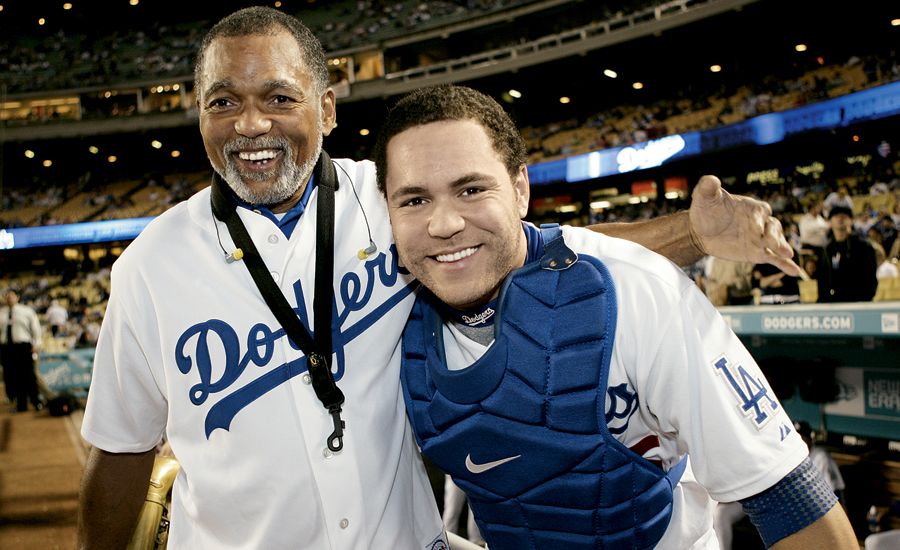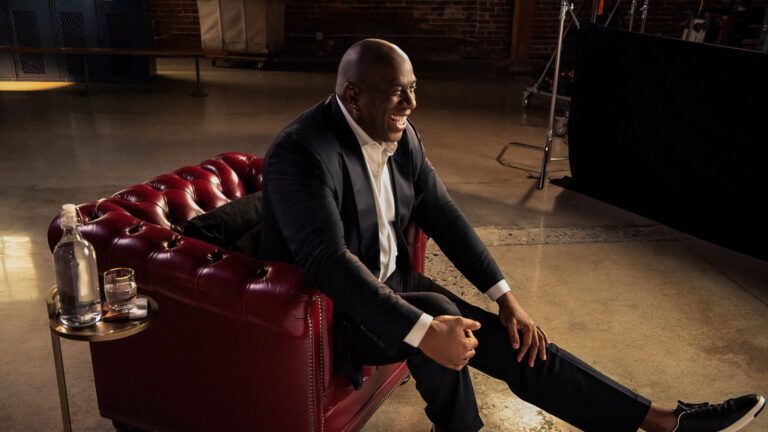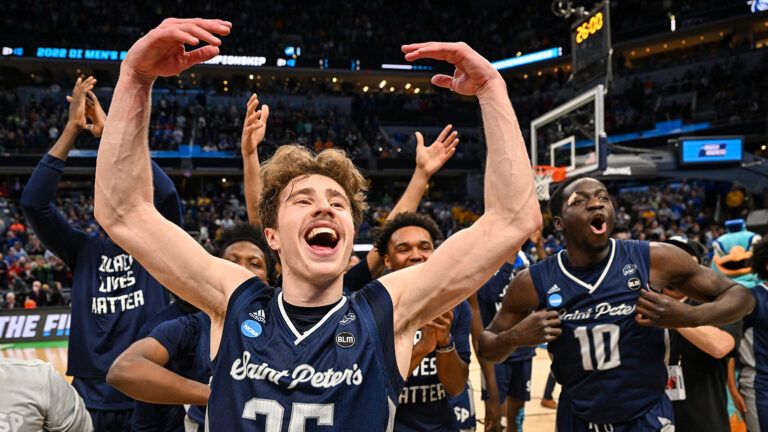I’m a professional baseball player. That means I’ve heard the national anthem performed before games thousands of times, by solo singers, military choirs, marching bands, the occasional recording star.
I place my cap over my heart, stand at attention at the top of the dugout steps and listen. We all do. But honestly, you don’t always pay strict attention. It’s hard to when your mind is on the game.
But this night was different. That was my dad out there, playing. He stood near home plate in Dodger Stadium last September, blowing into his old, tarnished saxophone (“Don’t want a new one,” he’d always say. “They don’t make them like they used to.”), playing to nearly 55,000 fans before our game that night against the Pittsburgh Pirates.
I watched anxiously from the top step of the dugout and followed every note, praying for him to do his best. A few bars into his performance, a funny thing happened. I realized our roles had reversed.
All my life he’d rooted for me, prayed for me to do my best. Now I was rooting for him. For most of his days he’d been a street musician, but thanks to him, I was the Dodgers catcher.
Sports and music have been the mainstays in my life for as long as I can remember. Sports, because from early childhood that’s what I loved—and did—best. Music, because that was as vital to my dad’s life as, well, breathing.
Our time together was important to me. He and Mom split when I was almost two, and during the school term I’d stay with Mom. She lived in Ottawa, Canada, two and a half hours from Dad’s home in Montreal. Every other weekend I spent with Dad, plus the entire summer.
Dad’s place wasn’t like Mom’s. Mom worked as a government analyst and lived in a comfortable home in the suburbs. Dad moved around Montreal a lot, from apartment to apartment, according to what rent he could afford. He couldn’t afford much. The biggest place he ever had was four and a half rooms. “Don’t you want a place like Mom’s?” I asked one day.
Dad sat me down. “Material things have never been important to me,” he said. “What’s important is happiness, fulfillment, chasing your dreams. My dream is music. Yours is baseball.”
It’s true. When I was just two, Dad tossed a ball in the living room. I caught it in two hops. “Did you see that?” he yelled, turning to his brother. “I think we’ve got a ballplayer here.”
Dad knew what he was talking about. He was more than a musician. He was also an athlete, an excellent baseball player who was quick and strong, and who loved the game. When he was a kid he’d talk his way into pickup games with older boys. “I’m Jackie Robinson’s son,” he’d say, and he was so good, they believed him.
From the time I was two, we spent every day we could at the local park, me with my little red bat and Montreal Expos cap, him with a bag of baseballs and two fielders gloves.
“Man!” he’d say when I got into one. “You really hit that ball!”
At home we turned on the Expos game. Dad is a great storyteller, and all through the game he’d talk about Robinson—how he’d dance off third base, drive the pitcher crazy and then swipe home.
Most of all, I loved it when he went into his announcer’s voice: “Now hitting for the Expos, Russell Martin,” he’d say. “Bottom of the ninth. Here comes the pitch. There’s a shot to deep right field. That ball is…out of here!” That’s when I knew what I wanted most in life: to be a major-league ballplayer, to hear my name for real over a major-league stadium’s booming PA.
Dad worked me hard, putting me through countless drills. Weird stuff, stuff he’d just make up. “I’m going to throw the ball over your head,” he’d say. “I want you to dive for it, whether you reach it or not.”
Sometimes he’d hand me a broomstick and toss a badminton bird at me. “Let’s see you hit it,” he’d say. Or he’d put a towel over my bat and tell me to swing, to strengthen my hands.
Dad rose each morning before dawn and headed to the subway. There, he’d pick a spot on the platform and play his saxophone, the case open at his feet for donations.
When rush hour was over he returned home and we headed to the park to practice. We broke at lunch, then returned to the field and practiced all afternoon. I’d be all tuckered out, but Dad went back to the subway station to play for the evening rush-hour crowd.
I never really thought much about how Dad earned his living. There was always food on the table—Dad would cook up a batch of stew or his fantastic chili, and we’d be set for the week. Each night we’d fill our bowls, turn on the tube and watch the Expos play. And we’d talk about life.
Dad grew up in tough times. He had to make his own way. “You want to be a ballplayer, you’re going to have to earn it,” he’d say. “You’re not a big guy. Nobody’s going to hand you anything. You’re going to have to work, work, work. And believe.”
That I did.
By the time I reached high school age, I was getting pretty good. That summer I asked Mom to let me live with Dad full-time. I didn’t want to leave her, but there was a high school that had a great baseball program in Montreal where I could go to refine my game. Mom—who was always there for me, and who helped Dad out with my expenses—said okay. She even paid a bunch of the tuition for me.
The school was across the city, an hour-and-a-quarter subway and bus commute away. “You’re going to have to make breakfast and get yourself to school,” Dad said. “Before you get up, I’ll be at work.”
One day, passing through the station, I heard the mournful wail of a saxophone. I’d known for years Dad played in the subway, but I’d never seen him perform. The haunting notes poured out, like the instrument itself were crying. Songs by Miles Davis, Thelonious Monk, Coltrane—my middle name. That must be Dad! I rushed to where he stood on the platform, and watched and listened.
The rush-hour crowd elbowed by. Some paused a minute to listen and drop coins into Dad’s saxophone case. Most had their minds elsewhere, and brushed past. Dad never batted an eye. He had an intent look on his face, like his whole soul was wrapped up in his music. Wow, I thought. Dad is really good.
“I saw you in the subway today on my way to school,” I told him that night. “How come you just play during rush hours?” It occurred to me that he could have made a lot more money by playing there all day.
“I do it so that I can spend the day with you and help you practice,” he said. “Like I told you, money isn’t what’s important in life.” That’s when it hit me how much my dad had done for me, how much he’d sacrificed for me, believed in me.
I guess that when you have two people who believe in the same dream, it’s twice as likely to come through. I could never pay my dad back. All I could do was be as passionate and devoted to my work as he was to his.
The day I made it to the Dodgers, I figured he’d be even happier than I was. But I couldn’t get ahold of him. When Mom finally did, he was standing by the Saint Lawrence River, practicing his second instrument, the flute. He had a hard time talking. He was just too emotional.
I flew him to Los Angeles as soon as I could. We were playing the Mets that night. Pitching for them was one of Dad’s heroes, Pedro Martinez. I hit a double off of him. As I rounded first, I heard Dad screaming, “Yeah, that’s my boy!”
The Los Angeles Times did a story about me and Dad. After that, it seemed everyone in the city knew Dad played the saxophone in the Montreal subway.
One day he got a phone call from Frank McCourt, the Dodgers owner. “I want you to come back in September,” he said, “to play the national anthem.” The night he performed, I was walking in from the bullpen, through the clubhouse, when he started playing. I raced to the dugout.
There he was on the field, playing that sacred song. He played it slow and soulful, giving it a kind of deeper meaning. I watched him with awe and an indescribable pride.
My dad.
He got a standing ovation when he finished. Both dugouts too. The Pirates players came up to me, saying, “That was your dad? Man, he’s amazing.”
Yeah, but not nearly as amazing as the two of us standing on the brilliant green grass of Dodger Stadium, sharing one dream together.





